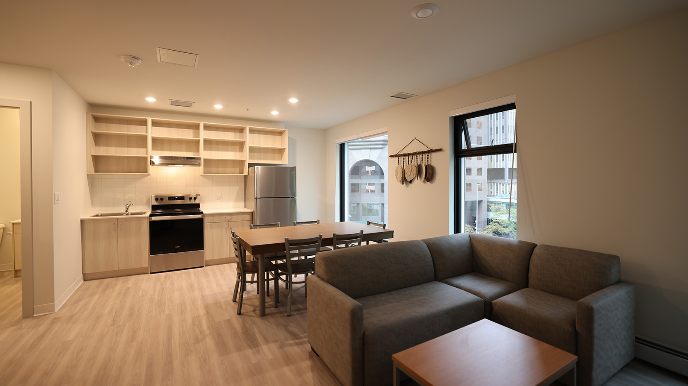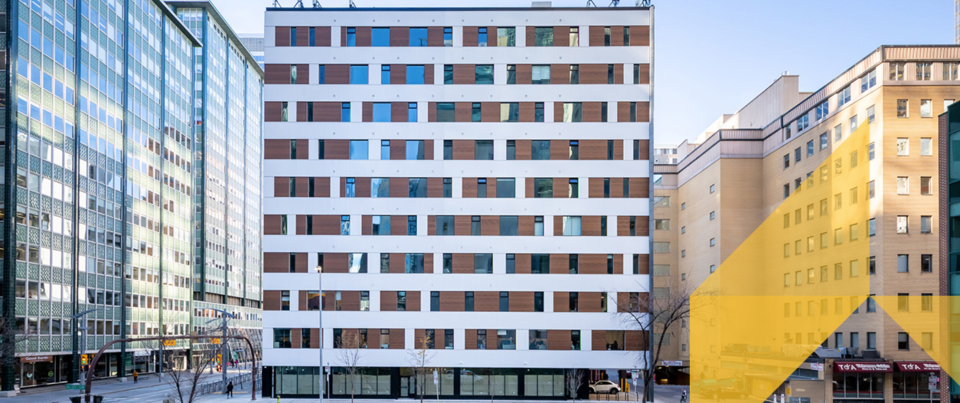With such a need for housing in Ontario, creative solutions must be sought.
For inspiration, we can look to a recent project in Calgary that was a tremendous success. It transformed vacant office space into affordable housing, helping to reinvigorate the downtown core and investing in the city’s future.
The project was executed by PCL Construction in partnership with Calgary’s HomeSpace Society, a charity that builds, maintains and manages affordable housing for vulnerable Calgarians. Their housing-first approach offers monthly rates that are consistently 30-36% below market rental rates. Their vision: “a home for everyone in our community.”
Communities throughout Northern Ontario should take note. PCL, a company serving Northern Ontario with an office in Sudbury, is both well-positioned and excited to take on more such projects.
“As the demand for office space shifted during the pandemic, Northern communities are dealing with many vacant buildings, which is discouraging for residents and may pose challenges with the attraction of newcomers,” says Anna Frattini, PCL Manager of Business Development & Relationships, Northern Ontario.
“Adding the need for housing in the mix, an opportunity exists to alleviate both problems by creating affordable homes from empty offices. The PCL Northern Ontario team is equipped to build quality multi-unit facilities including rental units, condominiums, seniors’ residences and emerging and innovative age-in-place facilities.”
Neoma
706 7 Ave SW, Calgary, AB
Creating homes where people can thrive was the goal of this project. Using innovative, client-focused building practices, PCL and HomeSpace worked together to create Neoma—the city’s first-ever vacant office building to be turned into an affordable housing complex.
The original 10-storey office space, formerly known as Sierra Place, was built in the 1950s, when many oil companies first started setting up their headquarters in Calgary. The economy was thriving, the city’s population was booming, and local infrastructure blossomed to meet the demand.
While the city continues to thrive today, vacancy rates in downtown office buildings are at an all-time high following the pandemic. There is also an acute shortage of affordable housing, especially in central neighbourhoods. It would seem, then, as if there was an obvious solution: convert this empty office space into affordable housing.
The vacant downtown tower was the perfect candidate for a retrofit, providing over 80 units of affordable housing. This much-needed housing helps several vulnerable populations, including low-income families and individuals such as seniors, adults with disabilities, Indigenous people, and newcomers to Canada. Close to a Light Rail Transit station, it is accessible for residents who use public transit.
This isn’t a simple and straightforward task, of course. A project of this scope requires an experienced builder that is committed to the community and can deliver innovative, customized solutions for their client.

PCL’s role
PCL demonstrated its solution-provider approach in several ways while working on the Neoma complex. PCL fast-tracked design, procurement and construction, and was dedicated to creating a strong and successful partnership with HomeSpace, always adhering to the client’s vision.
“Due to the timelines and PCL’s intel into the building, we felt incredibly taken care of by PCL,” says Matt Vermunt, director of acquisitions and developments at HomeSpace Society. “We’ve never worked with a group that executed a project so strongly, and we developed a great relationship with the team.”
Because HomeSpace is a non-profit organization, the budget was firm, due to public funding limitations. Time was also an issue, as the project, part of the Government of Canada’s Rapid Housing Initiative (itself an integral component of the larger National Housing Strategy), needed to be fast-tracked. In just 14 months, the conversion was complete.
“We had to bring in targeted trades early to work through the designs and ensure they stayed on budget while still achieving the intent of what the building is going to be used for,” says Rob Mitschke, PCL’s project manager on the retrofit. “We made our decisions and stuck with them, and the result is that we held the project timelines and installation schedules.”
Meeting budget requirements and timelines was essential, so the team implemented some additional strategies to help stay on track. These included the advanced procurement of materials and equipment, together with the simultaneous interior demolition, envelope removal and mechanical rough-in before the design had been completed.
The strategy: Reuse, revamp and remodel
PCL completed several detailed assessments in order to gauge the integrity of the building’s interior and exterior components. To determine what could be kept, upgraded, reused or replaced, their audit included a review of all of the pre-existing building materials and their adherence to modern building codes.
“We couldn’t tear everything out. We had strict budget limits,” says Mitschke. “We had to be critical about the ‘must-haves’ and ensure those items were covered first and foremost.”
For example, on one side of the building, PCL retained the original brick cladding but replaced the windows. To pay homage to the building’s history, they turned part of the original exterior envelope into an art piece for a feature wall in the lobby and transformed leftover metal grating into a bespoke light fixture.
This attention to detail and interest in preservation shows PCL’s dedication to going above and beyond in helping HomeSpace achieve their unique vision for the building.

Challenges and opportunities
Neoma’s central location is ideal for its residents, but it certainly presented some challenges for the construction team. The building was constructed right to the property line and because of site logistics only one public alley could be used for site deliveries. “There also wasn’t enough room to install a material or skip hoist, so we had to rely on the building’s passenger elevator inside for moving materials,” says Mitschke.
And yet, what might seem like a limitation was viewed instead as an opportunity for innovation. PCL used its Job Site Resourcing software, a cloud-based platform, to schedule all deliveries and ensure seamless material loading on site. The technology also allowed the on-site team to maintain positive relationships with adjoining properties so that deliveries did not impact their business.
The platform drastically reduced congestion on the project site, enabled the team to complete all deliveries from multiple trades, eliminated delivery conflicts and created an efficient flow of materials into the project site. Says Mitschke, “Our PCL technology helped us a great deal in overcoming very tight, challenging logistics.”
Looking ahead in Northern Ontario
In Sudbury and beyond, there are countless opportunities to make similarly meaningful office-to-residential transformations.
With the great success of Neoma, both HomeSpace and PCL certainly anticipate more such projects in Calgary and beyond.
“Many eyes were on the project from a municipal to federal level, wondering what is going to happen with the city’s office vacancy, and this was one piece of the puzzle,” says Vermunt. “I’ve also spoken to other jurisdictions, post-secondary students, the media, all calling to ask questions and use this project as a focal point for what they’re working on or studying.”
“For a non-profit organization looking at this approach for affordable housing, it’s a viable option for not only them but governing bodies as well,” Mitschke says. “Taking vacant buildings and turning them into places where people can live and thrive ticks many boxes when using public funds. Plus, the city becomes more vibrant.”
Along with its suites, Neoma operates drop-in spaces and on-site resources for the city’s vulnerable populations. The area intends to provide help and shelter to those who have needed it for decades. Being a part of something that will benefit the city far into the future comes with a profound sense of accomplishment for both Vermunt and Mitschke.
“Any time you see someone move into one of our buildings and get help, whether it’s youth or someone who did not get a fair start at life, it’s tear-jerking,” says Vermunt.
Mitschke adds, “I've worked in downtown Calgary for my entire career, predominantly working on office spaces, and there’s always a sense of pride in building a high-rise and shaping a skyline. But this project is different because, at the end of the day, we know that people have a bed to sleep in, and a good life becomes a bit more possible for those people.”
Whether market rentals, low-rise assisted living or innovative aging-in-place facilities, PCL will construct spaces that the occupants will call home, building with care and quality every time. PCL’s extensive construction experience and strong relations with subtrades in Northern Ontario ensures they will drive value to schedule, quality and safety. “Northern Ontario buildings that require renovations or upgrades are great contenders for this type of transformation. If the systems inside the buildings—HVAC, plumbing, electrical—need to be replaced, the project becomes more feasible. With the high demand for rentals, opportunities exist for these developments. We can definitely see this materializing in our area with the right building and a little bit of creativity,” says Frattini.
For more information, visit PCL Construction or call 705-995-2225.
Anna Frattini
Manager, Business Development & Relationships, Northern Ontario
PCL Constructors Northern Ontario Inc.
598 Falconbridge Road
Unit 15
Sudbury, Ontario P3A 5K6
M: 705-662-0367
E: [email protected]



